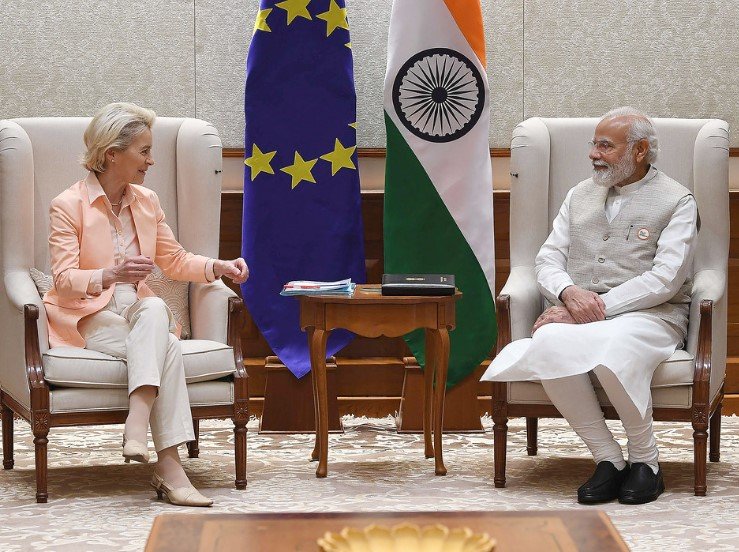Prime Minister Narendra Modi landed in Cyprus on Sunday, becoming the first Indian PM to visit the island in over two decades. It’s not just about trade. This trip speaks volumes.
India is resetting equations, and Cyprus — Turkey’s regional rival and the next EU Council chair — seems to be a quiet yet strategic first move.
A Presidential Welcome and a Personal Touch
It’s not every day the President of a country shows up at the airport to greet a foreign leader. But that’s exactly what happened in Larnaca. President Nikos Christodoulides personally welcomed Modi, a gesture that clearly didn’t go unnoticed.
Modi called it “special” and said the visit would “add significant momentum” to ties between the two countries. He emphasized the potential in trade and investment, but insiders say defense and digital cooperation are also on the table.
This is the first stop in a three-nation tour. Canada, where Modi will attend the G7, and Croatia, round off his itinerary.
And yes, it’s worth noting — no Indian PM has visited Cyprus since Atal Bihari Vajpayee in 2002.

Why Cyprus, and Why Now?
This trip isn’t just a historical checkmark. It’s loaded with signals — especially to Ankara.
Turkey’s vocal backing of Pakistan during Operation Sindoor clearly ruffled feathers in New Delhi. Modi’s stop in Cyprus isn’t just diplomacy — it’s a pointed choice.
Cyprus and Turkey have long had frozen relations, with Cyprus divided since 1974. Turkey recognizes only the Turkish Republic of Northern Cyprus — a move that isolates Ankara within the EU when it comes to this issue.
Now consider this: Cyprus takes over the rotating presidency of the European Council next year. Its voice in Europe is about to get louder.
What’s On the Table?
While final details of Monday’s bilateral meetings haven’t been released, early signs suggest the agreements will touch a few key areas:
-
Bilateral trade expansion, particularly in services and IT
-
Investments in green tech and infrastructure
-
Visa facilitation for Indian professionals
-
Security cooperation, possibly intelligence-sharing
Cyprus is looking for digital partners and political support. India wants more allies inside the EU and Mediterranean. There’s mutual benefit here — and both sides know it.
EU Chairmanship Adds New Weight
Cyprus’s upcoming EU Council presidency starting July 2026 adds a unique twist. Modi’s government has made a conscious effort to build personal chemistry with small but strategic EU players — Lithuania, Greece, Portugal — and Cyprus fits that pattern.
Here’s a quick look at what Cyprus’s leadership in the EU could mean for India:
| Cyprus as EU Chair (2026) | What it Means for India |
|---|---|
| Agenda-setting power | Can influence debates on Indo-Pacific, digital rules |
| Trade policy input | Could support EU-India FTA revival |
| Climate and tech talks | Opportunity to push India’s green hydrogen and solar initiatives |
| Migration policy voice | Room to discuss smoother work visas for Indians |
This isn’t about size. It’s about leverage.
Operation Sindoor’s Echo Still Lingers
Modi’s international itinerary after Operation Sindoor — a military confrontation that reportedly involved cross-border targeting of terror camps — was always going to be closely watched.
Turkey’s backing of Pakistan during those tensions hasn’t been forgotten in Delhi. So, choosing Cyprus, a geopolitical thorn in Turkey’s side, as the first stop isn’t random.
One official, on condition of anonymity, said the move is “as much about optics as outcomes.” Another added, “It’s quiet but deliberate.”
Canada and Croatia Next, But Cyprus Sets the Mood
While the global spotlight will shift to the G7 summit in Canada later this week — where India is expected to discuss AI governance, digital trade, and climate finance — Cyprus has already set the tone.
Croatia, the third stop, will be more about cultural ties and regional cooperation in the Balkans. But again, it’s a region where Turkey also has influence. The dots are starting to connect.
There’s a diplomatic rhythm to these visits that isn’t loud, but it’s unmistakable.
Not Just Symbolism — There’s Substance
Sure, Modi’s visit is filled with symbols — from the airport reception to the planned speeches. But there’s real stuff happening too.
In fact, Indian companies have been quietly expanding operations in Cyprus’s financial and IT sectors. Data from the Cyprus Investment Promotion Agency shows Indian FDI inflows tripled between 2021 and 2024.
Meanwhile, Cypriot universities are wooing Indian students in pharma, engineering, and maritime studies. With better visa rules, those numbers could spike.
And let’s not forget — Cyprus has shown interest in India’s Unified Payments Interface (UPI) system.
That might sound small, but it’s not. If Cyprus pushes UPI adoption within the EU framework later, it could be a financial win for India.
Vajpayee’s Visit in 2002 and the 23-Year Gap
When Atal Bihari Vajpayee visited Cyprus in 2002, the global order was different. China was rising, the EU was still consolidating, and India was just stepping into globalization.
Fast forward to 2025 — India is the world’s fifth-largest economy, tech savvy, and more assertive globally. That 23-year gap in high-level visits wasn’t just diplomatic drift. It reflected a prioritization problem.
Modi seems to be fixing that — and the Cypriots are responding warmly.
